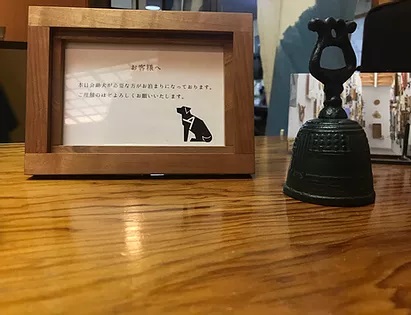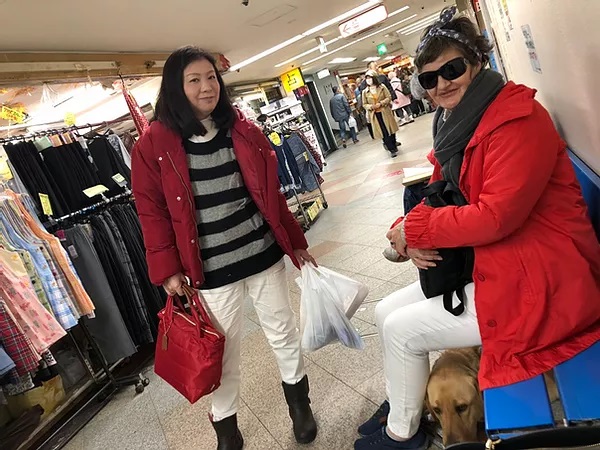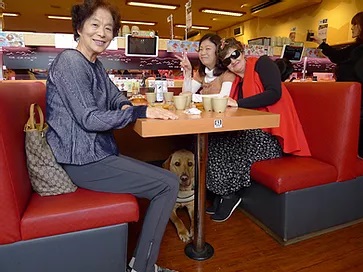Country: Japan
Japanese Etiquette
Time to read: Approximately 5 minutes
Japanese people are extremely aware of the impact they have on others. Respect is a cornerstone of Japanese culture.
However respect is a two-way street - we should be respectful too - when in Rome!
Mutual respect
The Japanese will absolutely accommodate and consider your needs, much more than you would expect in any other country.
As an example, when I tried to book at a Japanese Hot Spring, the staff agonised over how to make my visit go smoothly. In so far as to have an ornate wooden-framed sign made just for my visit, indicating that a guest was staying with their Assistance Dog and asking for other guests' understanding (see photo). This sign was a show of respect - simultaneously - not just for me, but also for their other guests.
- For me it demonstrated that Nixon was a Guide Dog, and the staff had accepted his presence
- For others, it communicated my requirement in advance, so that they weren't unprepared for his presence and behaved respectfully. Just reacting shocked by his presence would have been seen as rude.
Everybody needs to participate in this mutual culture of respect. This means us.


Thinking of others
We have written a few hints on how Japanese customs affect our roles as handlers in Japan:
- Don't go in narrow shops (and there's plenty of them), where there is hardly space for one let alone space for you and your dog. It may be your right but it is completely impractical
- Avoid taking up too much space with your dog; try not to get in the way of others
- Leave space for passengers to disembark before you embark
- Ask the staff where you should sit as you are entering restaurants or cafes. There is a space issue in Japan
- Keep your dog well-groomed and avoid contact between your dog and other people unless they initiate it and you feel it is appropriate. Many Japanese people have allergies
- Keep your dog away from food as much as possible in supermarkets. Japanese people are very hygiene conscious
- Always wipe your dog's paws and use a blanket for them to sit on in a traditional restaurant or café that has tatami mat (woven straw matting) floors.

Etiquette in Hot springs (Onsens)
Although I am a big believer in free access for everyone, I would think twice before taking an Assistance Dog to a hot spring. Don't be surprised if they don't take your booking for the following reasons. This is not discrimination but cultural sensitivity:
-
As water overflows in the bathing areas, taking your dog close to the baths is not possible
-
Leaving your dog in the change area by themselves is not an option, as they are behind an opaque screen so cannot see you. Also, most guests would be alarmed to see an unattended dog in the change area so management would not be comfortable letting you do this
-
You could leave the dog in your room, however, some managers would be uncomfortable about this
-
Another option might be to ask management to look after your dog, but don’t be surprised if they find this unacceptable too
-
Management are highly concerned about your safety and the safety of others, so they are on edge while you are there. I certainly felt this
-
The baths are often segregated by gender, so if visiting with someone of the opposite sex, your human guide cannot be with you
-
Bathing by yourself is virtually impossible as the bathing areas are highly slippery with difficult access.


Respect for Elders
The elderly in Japan are highly respected by everyone. Their needs are considered at all times.
Because of this, they are not accustomed to getting out of the way, so I recommend you walk with a sighted person wherever possible.
We share priority seats with the elderly - you might not get a seat!
Respect for customs and laws
- Access confusion is likely a result of misunderstanding, not discrimination. Any resistance met is usually staff considering everyone's needs and expectations equally. As soon as they are made aware of the access laws, we have found that they will be more than accommodating, apologising profusely for not being aware of your needs. Show them the Quick Access Leaflet from the Japan Ministry of Health, Labour and Welfare (PDF).
- In Japan, the taxi door opens and closes automatically by the control of the driver. Don't sit in the front of taxis or open a taxi door yourself as this is considered rude. Wait until the driver opens your door (at the back left side).
Toileting
It is customary for Japanese Assistance Dogs to be discreet with their toileting. Even they go in private, like a human! In addition, it is very much a concrete jungle in Japan, with few outdoor toileting opportunities. There are very few parks, wood chips, pebbles or grass areas.
- If your dog is willing, bring them into a disabled toilet and have them wee on an absorbent pad (Nixon refused such an invitation)
- Alternatively, if your dog is trained to wee with a toileting harness, you can use this in a disabled toilet or outside
- If your dog insists on nature, be prepared for odd looks and stares. An Assistance Dog is a sight people will not be used to, let alone one going to the toilet!
- Find a discrete spot to toilet your dog and use a bottle of water to wash the wee down or collect the poo in a bag. It is not etiquette to toilet:
- near shop entrances or house entrances
- in the underground in the subway
- in shopping malls even if they are outside.
